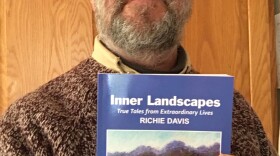For his first novel, “Ring On Deli,” Eric Giroux used a bit of his own teen experience working at the local Market Basket, a family-owned New England grocery chain.
In 2014, Market Basket workers around the region protested the sacking of the CEO, and walked off their jobs. Against all odds, the protests forced the Market Basket owners to reinstate the CEO, Arthur T. Demoulas.
Giroux, who was by then an attorney at the U.S. Securities and Exchange Commission, said he was inspired by what happened.
"Ring On Deli," which takes place in a small town outside Boston, is about the people who work and shop at Bounty Bag, where the slogan is, "Stretch your buck!"
Giroux said the story centers around two brothers.
Eric Giroux, author: Ray and Patrick are the heart of the book, to me — their relationship is the heart of what this book is about.
Ray is someone who dearly loves his kid brother, and maybe even more so, in his case, because of the traumatic childhood that they both had.
He's trying to control and manage the situation. He does all of these weird things to try to make everything not only stable, but almost monotonously repetitive. Like, he stocks the shelves of their home with Bounty Bag generic goods. It's sort of almost like a gesture of patriotism for the supermarket, but also a uniformity and predictability that he's seizing on, there.
Patrick, for his part — in some ways, you might even say he's a deeper and more advanced person. He’s on to some questions that Ray is brushing under the rug: that independence matters; that the ability to cope with change and suffering, and confront them dead on, is important.
Jill Kaufman, NEPM: You've got the essence of what makes up some New England rural and suburban towns, how things get done — how, sometimes, school districts depend on a big company in town to help out. And that is part of "Ring on Deli" — the high school principal is desperate to get a new building. But also, so many elements in your writing show an appreciation of language and of American history.
I wouldn't have written about those things if they didn't play into the themes, and what the book was about. You know, law interests me, because I love history, and the law is sort of history combined with force. Or it's the residue of the use of force in history. So that really interested me, too.
And so this supermarket is grappling with that. The employees are grappling with that. And the town is grappling, as a sort of counter model of a dysfunctional...side of America, with all of the weird dysfunctionalities of American democracy — and hopefully the entertaining and humorous results of that, but some of them played for satire, some of them deadly serious.
You wrote this before the pandemic, and at the end of "Ring on Deli," there is a postscript. In a way, this is almost a love letter, or it’s a great appreciation for those who we now consider front-line workers.
Yes, the world seemed to change in a very big way with COVID-19 after I finished the book. But some things from the COVID world — the importance of supermarkets, the economic collapse that hovers over this small town in my novel, the consequences of inequality, how this virus has impacted people in this country. I felt required to address that. Then, when George Floyd was murdered, I felt I wanted to say a little bit of something about that.
I don't want to give away the ending, but I do want to say that you wind your way out to western Massachusetts. What made you bring the book outside of Boston?
I have a very soft spot for western Massachusetts. My parents both grew up in Northampton. That's where we would go on the weekends to visit my great-aunts and my grandmothers, and get candy downtown and go to Look Park.
But at the very broad level, I would say, without giving away the ending, that something happening outside of this little town in Greater Boston represents an expansion in the imagination and heart of certain characters. So it's a step forward to go to western Mass.







